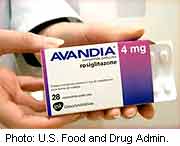
THURSDAY, July 15 (HealthDay News) — One day after a U.S. advisory panel recommended that the controversial diabetes drug Avandia stay on the market — albeit with added restrictions — several medical organizations are urging patients not to change their medications before consulting a health-care professional.
Some experts expect the use of Avandia to drop off markedly, however.
“Why give a drug with restrictions when a similar drug which has studies that did not show the bad outcomes of Avandia could be used instead,” said Dr. Jacob Warman, chief of endocrinology at The Brooklyn Hospital Center in New York City. “I don’t see anybody willing to take Avandia when they could take Actos.”
Actos (pioglitazone) is a drug similar to Avandia, one of the same class of medications known as thiazolidinediones (TZDs).
On Wednesday, a U.S. Food and Drug Administration advisory panel voted that the blood sugar-lowering drug did raise the risk of heart attacks relative to other medications of its kind, though not the risk of death.
The 33-member panel ultimately voted that Avandia should stay on the market but with tightened controls.
Twelve members voted for removing the drug, 17 voted for new warning label revisions or restrictions on its use, and three voted that no changes were needed.
The FDA is not obligated to follow the advice of its advisory committees but usually does.
The safety of Avandia has been in question for years, rising to a point in 2007 when the FDA added a “black box” warning to the drug’s packaging that noted the potential risk of increased cardiovascular events.
Both Avandia and Actos already had warnings regarding heart failure.
In a joint statement released Wednesday after the vote, the Endocrine Society, the American Diabetes Association and the American Association of Clinical Endocrinologists urged patients not to change any drug regimens without first talking to their doctor.
“Patients should continue taking all currently prescribed medications unless instructed otherwise by their health care provider,” Dr. Robert A. Vigersky, immediate past president of The Endocrine Society, said in the statement. “Stopping diabetes medications can cause significant harm and result in higher levels of blood glucose that may cause severe short-term health problems and could increase the risk of diabetes-related complications in the long term.”
The statement added that “reports regarding the cardiovascular safety of rosiglitazone [Avandia] have not been definitive,” while also pointing out that other drug options are available.
The American Heart Association released a similar message, advising patients to talk to their doctors before changing treatment.
The heart association also advised that the glucose-lowering medication metformin should be the first line of attack in treating diabetes. If metformin doesn’t do the job, the AHA recommended that other drugs could be “considered,” adding that “patients should not expect it to reduce the risk of a heart attack or stroke.”
Dr. Arthur Moss, director of the Heart Research Follow-up Program at the University of Rochester Medical Center in Rochester, N.Y., and one of the three panel members who voted to keep Avandia on the market as is, thinks the drug still has a role to play.
“It does lower blood sugar quite effectively. It has a pretty good track record,” he said. “As with other medications it can have some side effects. The only thing that is certain is that it does seem to increase the likelihood in some vulnerable patients of increasing heart failure, but that’s been known for some time. There’s suggestion that it reduces the occurrence of stroke, and all the other information is equivocal because the studies were not in any way definitive,” Moss stated.
“In my opinion, it’s dangerous to say that the medicine that’s been on the market for 11 years and that has been very effective in many patients [should not be used],” Moss added. “The benefits, in my opinion, still outweigh any potential risks.”
More information
The U.S. National Library of Medicine has more on thiazolidinediones.

